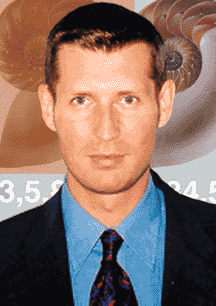INTERVIEW
Through Bull And Bear, They Are
THE SURVIVORS
by John Sweeney and Jayanthi Gopalakrishnan
As goes the Nasdaq, so does the number of daytraders. Or so it seems. Those who continue to trade as if nothing changed are those who can call themselves, with confidence, traders. Former STOCKS& COMMODITIES Editor John Sweeney (JS) and current Editor Jayanthi Gopalakrishnan (JG) talked to three such market survivors - Mark Pancak from Vancouver, BC, Canada, Aaron Schindler from Chicago, IL, and Ralph Kosche from Seattle, WA - to find out how they held up during the bear market. All three are truly traders; tending to introspection, they are not analysts, boast no newsletter experience, and have no journalists clamoring for sound bites. (STOCKS & COMMODITIES doesn't count.) They each have their unique strategies, systems, or techniques, but they all have one thing in common, as S&C found out.
MARK PANCAK

When I looked at my trading over the course of the last year, I've broken even on all my long trades and cleaned up - in relative terms - on the short side.
John Sweeney: Mark, tell us a little about your background in trading.
Mark Pancak: My father introduced me to trading when I was in my teens. Since then, I've been studying the market actively and trading. It is basically a love affair. I trade mostly from a systematic approach. Over the years, through constant education, I have developed mechanical systems that are able to extract money out of the markets. Since I first had the opportunity to apply my knowledge, it took me several years and many failed accounts to come up with a system that I am satisfied with. Over the course of the last three years, I've been profitable.
JS: All during the bear markets?
Pancak: Yes, interestingly enough I've been able to make a living out of it.
Jayanthi Gopalakrishnan: Do you trade stocks or futures?
Pancak: I would say that 95% of the time I am swing trading the E-mini products.
JS: What is the time frame of your trading?
Pancak: Since I consider myself a swing trader, I hold trades overnight. On average, I make somewhere in the neighborhood of around four trades a week. I find it gives me the ability to participate in the larger moves. I'm not a twitch? trader - I try to stay out of the noise; we're well aware of the noise in the index products. I hold trades for a maximum of probably two and a half days. What I am trying to do - because I am an independent trader and don't have a lot of capital; technically, I'm still a student at the University of Toronto in mathematics - is make a business out of trading.
AARON SCHINDLER

I'm very systematic and mechanical. I just do what the system I built says.
JG: How about you, Aaron? Can you give us a brief background on your trading?
Aaron Schindler: Right now, I'm trading the E-mini Nasdaq. I'm more of a futures trader than a stock trader. Typically, it is short term. I frequently hold overnight and try to get a one- or two-day trend. I also like to mix in some behavioral finance theories. I have found that good news takes a while to sink in before everyone acts on it. Because of this, you tend to get trends that last a day or two. I like to take advantage of these.
JS: How long have you been doing this?
Schindler: I've been trading on my own since April 2000.
JS: April of last year? The peak of the Nasdaq!
Schindler: Yeah. Fortunately with futures, there's no uptick rule, so I can go short as well as long. In fact, I've made most of my money on the short side.
JS: Did you expect that?
Schindler: No, I didn't. In fact, in backtesting my system using C++ I found that it tended to make most of its money on the long side. There is a bias in the parameters to go long and the system goes long more easily than short. Actual trading on the long side has been difficult, though. I'm only slightly profitable. It seems every time I go long the market caves under me. I'm much more profitable on the short side. The market tends to pleasantly surprise me more often than not and the trades go well the way it did today [July 23, 2001]. I was expecting the market to show a little strength on the back of the Cisco upgrade overnight. Considering we had a pretty weak market last week, with the Nasdaq down a couple percentage points, I thought there would be a rebound today. I was prepared to reverse and go long, but the market was just in a downward grind most of the day.
RALPH KOSCHE

In 1999 I got out of the market and took a job in Alaska with a fishing company.
JG: Let's see if Ralph Kosche's trading is any different. Ralph, tell us how you got started in trading.
Ralph Kosche: I've been more of an investor, holding my self-created retirement and mutual funds. I was working in the fishing industry for a time when I was between jobs. I decided to follow the more active trading lifestyle and got into daytrading. This was in spring 1998. Those investments ended back in the runup in July of that year. They made some good hits, but I ended up getting hurt badly by shorting the big bull out of November-December that year and not obeying any stops.
JS: How'd you do?
Kosche: The trades basically wiped me out. In 1999 I got out of the market and took a job in Alaska with a fishing company. When I left that, I got slowly back into doing some trading in the markets. I again got caught up in the 2000 peak, but fortunately, this time I didn't get hurt too badly.
JS: You were lucky!
Kosche: I got stuck in a few bad positions, but I kept everything
tighter. I made some money and started applying various analytical techniques
such as the Elliott wave theory. I consider myself an Elliott wave analyst,
a skill that I improved drastically in 2000. I recognized what wave patterns
appeared in the March 2000 peak and made things work very well for me from
June through August 2000, selling all major positions at the first peak
in September. I called that top very well and got on the short side from
September 2000 through February 2001. I made back a substantial portion
of the amount I lost. I still mostly position trade, although I daytrade
occasionally.
...Continued in the October 2001 issue of Technical Analysis of STOCKS & COMMODITIES
Excerpted from an article originally published in the October 2001 issue of Technical Analysis of STOCKS & COMMODITIES magazine. All rights reserved. © Copyright 2001, Technical Analysis, Inc.
Return to October 2001 Contents